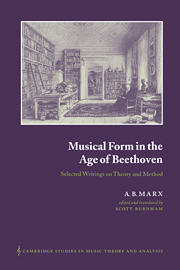Introduction: Music and Spirit
Published online by Cambridge University Press: 03 December 2009
Summary
We are only now beginning to perceive the full extent of Adolph Bernhard Marx's presence in nineteenth-century musical thought. A novelist seeking to bring that age and its thought to life would be hard pressed to invent a more appropriately fascinating figure. Although not destined to realize his early dreams of becoming a great composer, Marx was all things else: brilliant conversationalist, fierce polemicist, provocative critic and editor, active participant in a newly galvanized intellectual and cultural milieu (Berlin, shortly after the founding of the University of Berlin), advocate of Beethoven and the first theorist to address the challenge of that composer's music in a comprehensive fashion, systematic yet poetic thinker and writer, progressive pedagogue involved in Prussian educational reform, and the author of books on Gluck, Beethoven, composition, pedagogy, cultural criticism, music history, tone painting, and even vocal technique. What made this range of enterprises possible was a world view that entailed, above all, a single-minded sense of mission. For Marx drew energy and focus from his self-imposed calling, which was nothing less than helping to usher in a new age of music and musical understanding, and then working to preserve its glory. His writing is replete with the heady bombast and brimming high-mindedness that such a task so often invites and perhaps even requires.
Any calculated selection of writings from an author as prolific and many faceted as Marx is bound to represent a degree of tendentiousness.
- Type
- Chapter
- Information
- Musical Form in the Age of BeethovenSelected Writings on Theory and Method, pp. 1 - 14Publisher: Cambridge University PressPrint publication year: 1997
- 1
- Cited by



